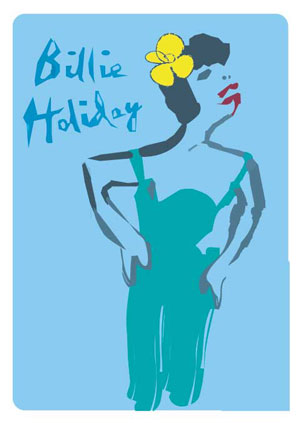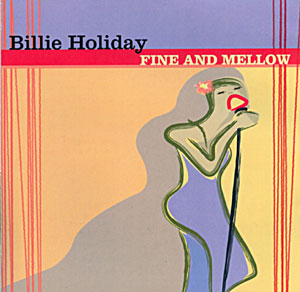|
Billie Holiday BiographyBillie Holiday Fine Art Print
Billie Holiday Biography is about probably the most well known female jazz artist... The lady had the blues folks! She was some lady to deal with all the stress in her life. Today it is easy to get mental help for depression, but in Billie's time, it was not so easy... today Xanax or Prozac is easily available! For Billie it was alcohol and heroin... what a shame! Billie "Lady Day" Holiday was born in Baltimore in 1915. She had a hard childhood -- her musician father left the family early, and her mother wasn't able to keep her consistently which resulted in Billie often being put in care or relatives who abused her. She was raped at age 11 and grew up in poverty. She says it best in the first line of her famous autobiography Lady Sings the Blues, "Mom and Pop were just a couple of kids when they got married. He was eighteen, she was sixteen, and I was three." In 1929, she moved to New York, where she worked as a maid and then as a teenage prostitute. According to legend, in 1930 (at the age of 15), to keep her mother from being evicted, she sang Body and Soul and reduced the audience to tears. The lady sure could sing folks... even as a kid she was a grown woman. Billie Holiday began singing in bars and restaurants. Four years later, she made her first record with Benny Goodman. In 1935, she got her big breakthrough when she recorded four sides, which featured What a Little Moonlight Can Do, and Miss Brown to You. She landed her own recording contract, and while the songs given to her were run-of-the-mill (versus the ones saved for the top white singers), she made the songs classics because of her singing ability. The girl had away of "owning" any song she sang... she put her "stamp" on it! LIKE A TRUE "JAZZ-CAT"! Her voice-quality wasn't outstanding and her vocal range was limited, but she had an uncanny ability to breathe life into a song, using things like pauses and slurs -- which made the song become a story or an experience, rather than just a group of notes sang with a voice. She poured her heart and soul into every song and her ability to interpret a song and make you feel it was unheard of. While it is more commonplace today, Billie Holiday pioneered the style, and this is how she took ordinary 2nd-rate songs and made them extraordinary. In 1936, she recorded with pianist Teddy Wilson, where she first worked with Lester Young. These two were made for each other. When he played his phrases with hers, he breathed as she breathed. They perfectly complimented each other stylistically. He nicknamed her "Lady Day" and she nicknamed him "Prez." They sounded like 2 voices from the same person. Her recording career is divided into 3 periods. The first is the period in the 1930s, recorded with Columbia, marked by her time with Wilson, Goodman, and Young. Her music was made for jukeboxes, but she turned them into jazz classics. Her popularity never matched her artistic success, but she was widely played on Armed Forces Radio during World War II. From this period came the anti-racism song Strange Fruit, in which she paints a terrifying picture of lynched black bodies hanging from trees. The lyrics of the song were adapted from a poem by Louis Allen. The next period is her Decca (record company) years in the Fourties, marked by recordings with string orchestra accompaniment. While the records from this period are impressive, they're not as "jazzy." This period featured Loverman as well as her self-written classics Don't Explain, and God Bless the Child. In late 1947, she was arrested on drug charges and spent 18 months in a federal reformatory. But the lady made terrible choices when it came to men! She fell in love with men who stole money from her, abused her, and introduced her to heroin. When she got out of prison, she went back to heroin. To be honest folks; I guess a good for nothing man can drive any woman to drink or drugs! By the Fifties, the third period, her voice was going her voice was more croaky, and she sometimes missed notes, but her ability to interpret songs was enhanced. Some consider this work, with Verve records, to be some of her finest. Her classic recording of Lady in Satin was described by Ron David as though it "sounded like her voice had died and come back to haunt us from the grave." It isn't known if misery, drugs, or drink (or all three) killed her, but in a sad irony, she was arrested on narcotics charges while on her death bed in 1959. Isn't that a shame? Enough to give me the blues and cry in my beer! With all the sadness surrounding the lady, it's a wonder she could create the wonderful music that she did! Thank god for her strength to bring us a true original sound... a true DIVA is Billie Holiday! Billie Holiday biography and other Jazz Cats!
|




